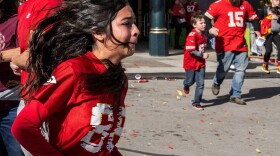Updated April 11, 2024 at 12:01 PM ET
The football great Orenthal James Simpson, known as O.J., has died. Simpson was 76 and had been battling cancer. In a post on X, his family said Simpson died on Wednesday, surrounded by his children and grandchildren.
Simpson was a cultural icon who starred both on the football field and in movies and commercials.
In 1994, he made headlines for another reason when he was accused of killing his ex-wife, Nicole Brown Simpson, and her friend Ronald Goldman. In 1995, jurors determined he was not guilty in the stabbing deaths. The trial was televised nationally and captivated the country. No one else was ever charged.
O.J. Simpson first found fame on the football field. He played at the University of Southern California in the late 1960s. The powerful tailback danced, dashed and dazzled on the field, propelling the Trojans to a national championship in 1967. He won the Heisman trophy, as college football's best player, in 1968.
After graduating from USC, he played 11 seasons in the NFL mostly with the Buffalo Bills. Known as "The Juice," he collected four rushing titles, played in five Pro Bowls and, in 1973, became the first running back to break the 2,000-yard rushing mark.
During and after his pro career, he starred in TV commercials, mostly notably as a pitchman for Hertz as he rushed through airports for the rental car company. He also later appeared in several movies as producers seized on his fame and likeability.
In 1994, the bodies of his ex-wife, Nicole Brown Simpson, and her friend, Ronald Goldman, were found stabbed outside her home in Los Angeles. Not long after, Simpson was arrested and his subsequent "low speed" white Bronco car chase on L.A. freeways was televised nationwide. In 1995, a criminal jury determined he was not guilty of committing the killings.

Dubbed the "trial of the century," the verdict reverberated across the U.S. with debates about police misconduct, race, celebrity and domestic abuse.
Two years later, a different civil jury determined he was liable in the deaths and ordered him to pay $33 million to the families.
That wasn't his last tangle with legal trouble. In 2007, he led a group of men to a Las Vegas hotel room to confront some sports memorabilia dealers. Several people brought guns with them, and Simpson was later convicted of armed robbery. He served almost a decade in a Nevada prison and was released on parole in 2017.
The public's fascination with O.J. Simpson never waned. He was the subject of numerous documentaries about the killings and his life.
Copyright 2024 NPR. To see more, visit https://www.npr.org.









